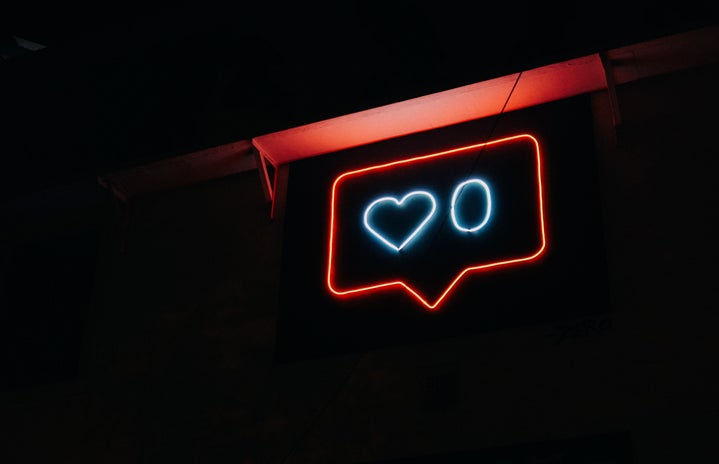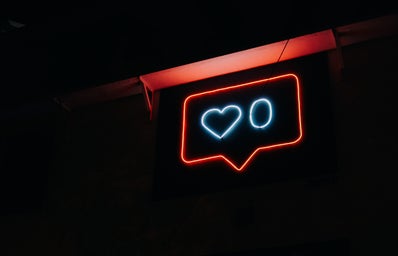an interview with slu’s biggest, best-kept secret.
On June 3, 2021, the Instagram account @slu_sluts was born, joining a slew of satirical Saint Louis University (SLU) posters such as @sluvirginityclub and @thegaywaytimes.
SLU, a Jesuit university in the heart of midtown St. Louis, is home to a large Catholic population. The school’s religious roots run deep: Jesuit priests teach many courses, students are required to take multiple theology classes and crosses hang in every classroom. SLU’s Student Health Center will not prescribe oral contraceptives or offer access to birth control of any sort, “in keeping with the Jesuit Catholic beliefs regarding family planning.”
If SLU won’t speak candidly with their students about “college things,” where do students go to speak candidly about “college things”? As it turns out, they go to Instagram.
Despite its name, @slu_sluts has become the unofficial voice of far more than just rebellion at SLU. In addition to memes and jokes, the account features guides to safe sex, choosing freshman housing, mental health resources and reassurances for those who may be struggling with life on-campus. @slu_sluts serves as as a safe haven on a campus which, for many, feels like anything but. The account’s sole administrator (who uses she/they pronouns) has remained entirely anonymous—but this has not protected them from public scrutiny.
In the fall of 2021, SLU students erupted at the prospect of Matt Walsh—a conservative political commentator whose anti-LGBTQIA+, pro-birth comments are highly inflammatory—speaking on campus. SLU’s College Republicans defended Walsh’s ability to speak at SLU, while @slu_sluts joined many students in protest, playing a critical role in the online debate. Though SLU dropped Walsh’s event, and he spoke across the street from campus, this was only the beginning of a tense political sparring—and one that @slu_sluts would become deeply entrenched in.
Googling “SLU Sluts” brings up a slew of right-wing commentaries, some of which come from prominent conservative news sites, all of which misconstrue the account’s gravity entirely. Conservative radio show host Annie Frey, The Daily Caller, Shore News Network and The Washington Examiner, among others, misnomered @slu_sluts as a student group and proceeded to denounce it. Even Texas senator and previous presidential candidate Ted Cruz joined in on the conversation.
What started as satire quickly grew serious—and behind the voice speaking to 2,568 followers is a human being. To get to know that human being, Her Campus conducted a virtual interview with her, which has been fully transcribed below.
Lexi Kayser, Editor in Chief of Her Campus at SLU (HCSLU): So, to start us off – what brought YOU to SLU? How did you end up here?
SLU_Sluts (SS): SLU had everything I needed — I wanted to be close to home, and I wanted to do it for a low price. In my program, SLU is also known for having a really tight knit community with lots of career opportunities and I really wanted to take advantage of that.
HCSLU: Sounds like the perfect fit! How soon after arriving at SLU did the idea for @slu_sluts come to you? Do you remember what provoked it?
SS: I actually started it before I had ever set foot on campus. I was originally planning on going to a different university, and that university had a similar page to combat the misogyny, slut-shaming, and generally anti-woman history that that university had. After a few other pages started popping up, like Brynn Mawr College bimbos and Dartmouth bimbos, I really fell in love with the concept. Once I saw that the SLU Virgins existed, which I hadn’t realized was satire at the time, I felt that it would be fun and useful to have an anonymous feminine presence which represented sexuality that SLU women could see themselves in.
People have established this caricature of women in their head: bimbos — that we can’t be attractive, wear what we want, claim our sexuality and bodies, and be intelligent at the same time — so reclaiming that is really powerful to me.
HCSLU: Gotcha – I love that aspect of collaboration and influence from other online communities. You’ve become a bit of a journalistic presence as well – those graphics about housing are far better resources than even SLU’s own website! Who’s your target audience right now, and what are your intentions with the diverse array of content you post/repost?
SS: Ha! Thank you!
My target audience, as much as I joke about it being for the bimbos, himbos, and thembos, it’s for everyone. Truly, everyone. I do put an emphasis on providing resources mostly for freshmen because I remember how scary my first year of college was, but SLU has a tendency to have lots of different sub-communities instead of one big one. I really want to bridge that gap and get everyone interacting together as much as possible. That’s the only way that anything good can ever get done, one cohesive environment for all so long as they align with the message of being for and with others.
HCSLU: You speak to bridging a gap, and if there was ever a year to do so, it’s been this one. When you think back on this academic year—two student suicides, the Matt Walsh and abortion debates, COVID discontent—what emotions come to mind?
What’s it like to be a place people go for information and resources when you’re just a student watching these things unfold in real time, too?
SS: Thinking back on this last year, I definitely do feel a lot of heartbreak. It’s very hard watching a huge community, mostly consisting of young people who are already struggling, fall apart seemingly with no ground to stand on in the first place. It was like rain cloud after rain cloud was hitting our community back to back.
Then again, I also think about how our community worked so tirelessly to heal not only ourselves, but each other. Having been here during such a tough time on campus showed me that there truly are people rooting for each of us. Also, in regards to the protests, that did show me how powerful a student body can be. Collective pain brings collective healing.
HCSLU: I’m curious about you, as a human person, experiencing all of this online turbulence under near complete anonymity. There are some things only you have experienced. Googling “SLU Sluts” brings up a whole slew of articles from right-wing publications, many of which call you a “student group.” You’ve also spent some time as a conservative buzzword on Catholic Institution Twitter. Whats that initial feeling like, seeing that people are talking about you? Does it feel distant, like a joke? Does it feel real and frightening?
SS: I bounce back and forth between feeling that distance and feeling that fear. There have been real, raw moments on campus when I have feared for my safety and I was left feeling completely alone because the resources available are not made for people who are trying to keep their identities private.
In the moments where my name was used as a buzzword, I felt almost empowered. I remember texting my high school journalism teacher the link to a Fox News article, and he said, “You’ve made it. You are officially an enemy of Fox News!”
Moments like these felt like a success for me. Why would I want racists, misogynists, and transphobes to like me in the first place, right? That I didn’t care about. It’s when an abundance of people began to seek out my identity that I felt targeted and afraid. I love having the ability to separate myself from this, and the idea of not being able to do that? That horrifies me.
Though, I do want people to understand that fear. That simply existing as a woman who challenges misogynistic beliefs is not a safe thing to do.
“Simply existing as a woman who challenges misogynistic beliefs is not a safe thing to do.”
– Administrator of @slu_sluts
HCSLU: Where CAN you seek solace? Does anyone know who you are? How do you approach those conversations, and choose who to have them with?
SS: I found myself telling people impulsively. My old [resident advisor] knew who I was because I just needed someone to break down with. A few girls on my floor know. My boyfriend and high school friends know. Now, my rockstar parents know, which has been a game changer. A lot of the time though, this wasn’t enough. I found myself missing school and skipping assignments sometimes because of how much this online presence weighed on me.
I definitely wish I would’ve been more careful when I first started this, but I couldn’t have predicted that it would become so scary. Many people have chosen to share my identity with others almost as if it’s some insider information or some hot gossip. Some people, on the other hand, figured it out and waited respectfully for me to tell them. I love those people, and those who respected me in that way are the people that I choose to surround myself with.
HCSLU: I can imagine that’s such a delicate fulcrum to sit on. Being online in general is hard, but for you, it’s become larger and more political. You make it a point to check in on others, too, via stories and opening your [direct messages]. I know you have before, but do you often feel the need to step back and take a break?
SS: I absolutely feel like I should take a break sometimes, but it’s really hard to do that now that I’ve accepted that responsibility. It’s easy for me to say I need to take a break, but it’s hard imagining something bad happening to someone and then maybe seeing a missed message from them asking for help. I don’t think I’d be able to recover from that even though I know that I shouldn’t think that way. I’m working on giving myself space one day at a time.
HCSLU: I imagine you get a lot of messages—how many in a week, would you estimate? Do you think your anonymity coupled with the “behind the screens” presence contribute to how much people trust you?
SS: How many messages I get definitely depends on the topic. The most I used to get in one day was probably around… maybe 80 if I had to guess? It was crazy. Now that I’ve set boundaries in regards to what I promote and post I’ve gotten a lot less, and I’m touching on a lot less intense issues nowadays so that helps, too.
People love the anonymity, that’s another reason why I refuse to give it up. You’d think it would make people trust you less, but it’s the opposite. Lucky for them, I would never share their secrets. No matter how wild and crazy they are.
HCSLU: 80 is a LOT. How exactly do you set those boundaries? Has learning to do so carried over into your “real” life interactions?
SS: Honestly, I think I needed to be overwhelmed because before, I used to never set any boundaries at all. I’ve made a point to be honest with people and say I just can’t get to everyone in one day, as much as I want to. I really have to make the active decision to put my phone down and not let it spill over into time I’m supposed to be spending with my partner, friends, or family.
HCSLU: That’s such a difficult thing to learn, especially when juggling so many relationships in so many spheres.
“I’m working on giving myself space one day at a time.”
– Administrator of @slu_sluts
HCSLU: Switching gears to some fun stuff for these last few minutes:
Have you heard yourself referenced by others on campus before, but not been able to reveal your identity? What’s that really like, living the Hannah Montana life?
SS: Oh my god, I’ve definitely walked into lots of conversations about the account. Usually they’re positive, sometimes they’re not, I have a fun time talking about it either way.
I love living that Hannah Montana/Radio Rebel lifestyle. It’s also really good for assessing public opinion about it.
In fact, one time I met someone new, and realized I knew every single detail about their personal life. Usually, in that situation, I’ll tell the person it’s me because I feel that otherwise that’d be a little unfair to them.
HCSLU: That definitely makes sense.
It’s a long ways off, but have you thought about what happens when you graduate? Are you handing this off? Will you ever reveal who you are?
SS: I think it’ll depend, for sure. I’ve thought of a few different scenarios, but the one I like the most is making my own bimbo-Billiken graduation cap design! I think it will definitely depend where I’m at, because although I am a junior I will still be here for another three years since not all of my credits transferred, so there’s another three seasons of the bimbo show everyone has to sit through before I make that decision! If I had to guess though, I think I’ll keep doing it, or pass it on to a student or faculty member I trust.
HCSLU: Do you have any advice for other young users of the Internet?
SS: To other young internet users, just try to take everything a little less seriously. Conserve your energy. Make jokes. Try to be open-minded. This is all easier said than done, but they’re good goals to work towards.
HCSLU: Is there anything you want people to know about you, about anonymous online figures, anything we did not cover today?
SS: For one, I want people to understand the reason why I go by SLU Sluts. There’s a more in depth explanation on my page, but to keep it short: if you take back the words used to shame you, there will be no words left to use. I know my name is a controversial topic for some haha.
Secondly, there is this idea that I’m a political page. The truth is, I shouldn’t be considered a political page. I advocate for women. People of color. Those with disabilities. Queer people. Me advocating for the existence of human beings should not be a political statement, and I don’t consider it one. I’ve also never targeted people for their political affiliation despite what the far right articles about me will say.
As for the anonymity, if someone runs an anonymous page, it’s anonymous for a reason guys! Just respect that and let them deliver their message in the way that is safest for them.
“If you take back the words used to shame you, there will be no words left to use.”
– Administrator of @slu_sluts


